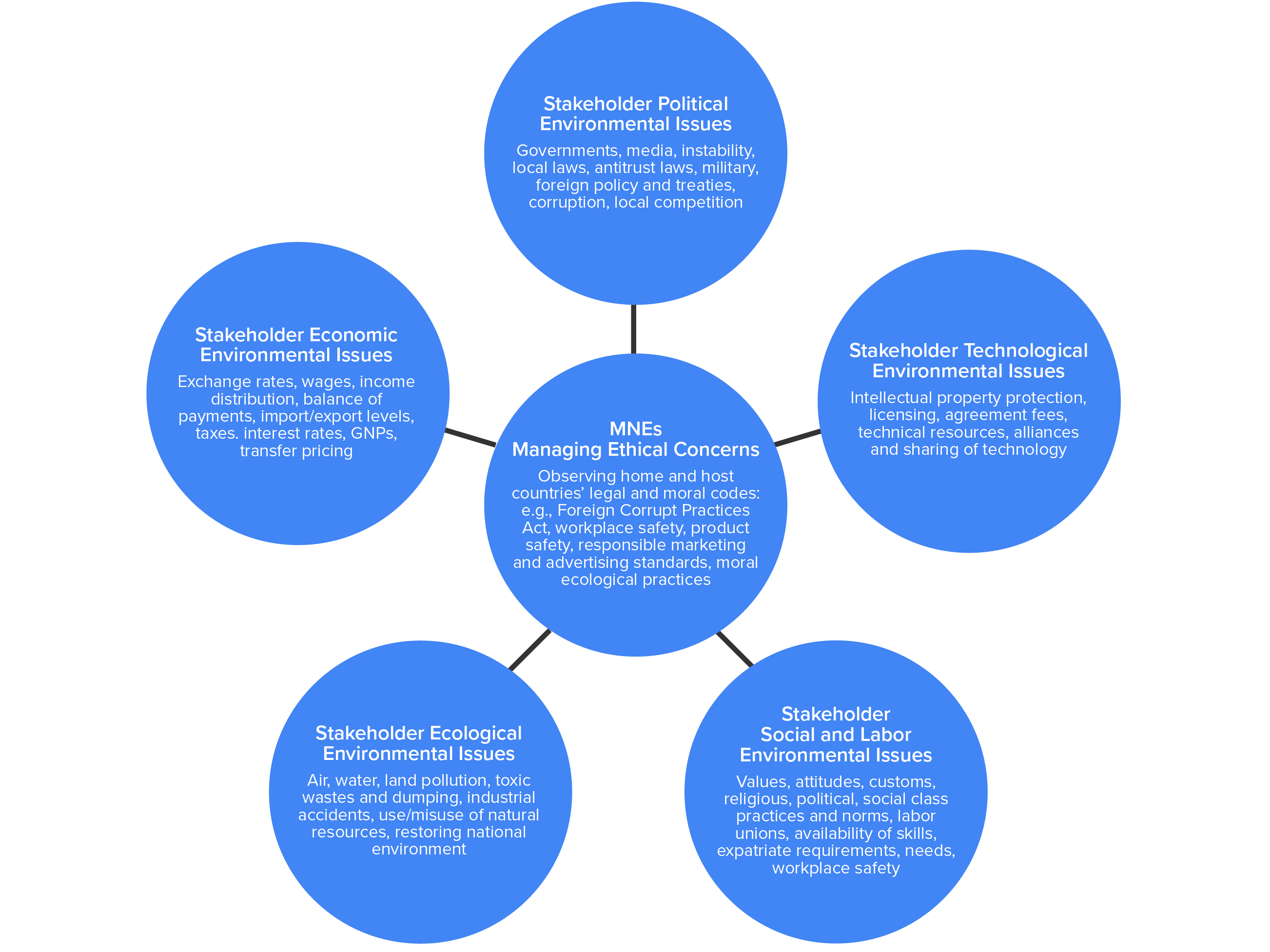Table of Contents |
Organizations operating on a global basis often face particularly tough ethical challenges because of various cultural, political, economic, technological, and market factors. The greater the complexity of the environment, the greater the potential for ethical problems and misunderstandings for global organizations (Daft, 2016). Recent and reoccurring global ethical problems and risks that organizations face include cybersecurity and political threats, international conflict and warfare, income inequality, planetary climate and environmental pollution and instability, corruption, and human and diversity rights violations.
The diagram below illustrates the wide range of stakeholders and issues related to several of the risks in this figure that MNEs (multinational enterprises) must either prevent from occurring or manage when doing business across and within different country borders.

Following laws related to doing business abroad is an added challenge for global firms. For example, the FCPA (Foreign Corrupt Practices Act) prohibits American firms from accepting or offering bribes to foreign government officials. U.S. individuals who cannot defend their actions with regard to the FCPA’s anti-bribery provisions can face harsh penalties. “U.S. companies can be fined up to $2 million while U.S. individuals (including officers and directors of companies that have willfully violated the FCPA) can be fined up to $100,000 and imprisoned for up to five years, or both. In addition, civil penalties may be imposed” (Weiss, 2014).
U.S.-based firms are also expected to not engage in unethical or illegal activities such as discriminating against local populations, violating local laws and norms, and disrespecting property and the environment. MNEs can also assist and add value to local countries. For example, the following practices are encouraged:
The increasing phenomenon of globalization (an integrated global economy consisting of free trade, capital flows, and cheaper foreign labor markets) also pressures global firms facing international risks to rely on governments, NGOs (nongovernmental organizations), the UN (United Nations), and other business and stakeholder alliances and relationships to help meet non-market threats (Dutton, 1999). For example, the ten principles of the UN Global Compact serve as guidelines for international firms doing business in LDCs (least developed countries), and abroad, businesses should:
While these principles may seem so universal as to be unattainable, they do stand as ethical milestones that protect human life, dignity, and personal welfare and values. However, when companies operate in LDCs and other cultures, it often is necessary to negotiate a balance between fairness, equality, and different local values and standards. U.S. and Western values may differ with local cultural norms, such as child labor and employee rights, in many countries. Donaldson and Dunfee offer methods for such negotiations (Donaldson & Dunfee, 2000).
MNEs must also create inclusive, ethical corporate cultures while managing both external and internal complexities such as hiring and training a diverse workforce, adapting to local culture norms while balancing home country ethics and values, and ensuring a multicultural approach to doing business across countries. Hanna identified five strategic questions that relate to organizational cultural sensitivities when doing business abroad as well as in a home country (Hanna, 2016):
Source: THIS TUTORIAL HAS BEEN ADAPTED FROM OPENSTAX “PRINCIPLES OF MANAGEMENT”. ACCESS FOR FREE AT OPEN STAX. LICENSE: CREATIVE COMMONS ATTRIBUTION 4.0 INTERNATIONAL.
REFERENCES
Cassin, R. L. (2017). Halliburton pays $29 million to settle Angola FCPA offenses. The FCPA Blog. www.fcpablog.com/blog/2017/7/27/halliburton-pays-29-million-to-settle-angola-fcpa-offenses.html
Daft, R. (2016). Organizational theory & design, 12th ed. Cengage Learning.
Donaldson, T., & Dunfee, T. W. (2000). A Review of Donaldson and Dunfee's Ties That Bind: A Social Contracts Approach to Business Ethics. Journal of Business Ethics, 28(4), 383-387. doi.org/10.1023/A:1006297614984
Dutton, G. (1999). Building a global brain. Management Review, 88(5), 34-38. www.proquest.com/openview/e286807675cdb68f149459b53957d794/1?pq-origsite=gscholar&cbl=41493
Hanna, D. (2016, April 11). Where can corporate culture and national cultures meet? Inside HR. www.insidehr.com.au/where-can-corporate-culture-and-national-cultures-meet/
United Nations Global Compact. The ten principles of the United Nations Global Compact. www.unglobalcompact.org/what-is-gc/mission/principles
Weiss, J.W. (2014). Business ethics, a stakeholder and issues management approach, 6th ed. Berrett-Koehler Publishers.